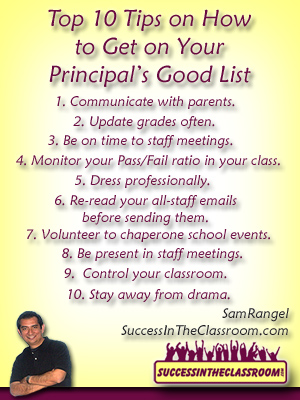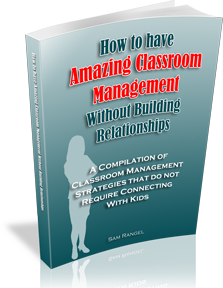Hello again,
Now that I’ve spent a year as an administrator (My administrator blog is here, by the way), I’ve been able to see teaching from a different perspective. I believe this different point of view offers me some valuable information for new teachers or for soon-to-be teachers.
Something that I noticed was that most teachers are hard-working, above-and-beyond, doing-what’s-best-for-kids teachers.
These teachers are spoken of highly by the principal and are the ones who are contacted when he/she needs a go-to person or a leader for special project.
As a new teacher, you want to get on your principal’s good side, and I don’t mean that you have to be a kiss-up or a yes-man.
You want to be in his/her good graces, because you might be needing a letter of recommendation from him/her and you most definitely will be asking him/her for a favor eventually.
You definitely don’t want to be that teacher who he/she complains about in the admin meetings.
Here are some basic tips to help you stay on your principal’s good list. Notice that none of these tips involves buying him/her gifts.
Top 10 Tips on How to Get on Your Principal’s Good List
1. Communicate with parents.
If you receive a call or an email from a parent, make sure you return that correspondence as soon as possible. You don’t want the parent to have to go to the principal, because you didn’t return their call.
2. Update grades often.
Don’t wait more than a week to update grades. Students need to know where they stand in your classroom. Parents will complain about you if their child was getting an “A” in week one, but and “F” in week nine without any updated grades in between.
3. Be on time to staff meetings.
Being late to a meeting conducted by the principal demonstrates lack of respect for his/her time.
4. Monitor your Pass/Fail ratio in your class.
You don’t want to have more than 10% of your students failing your class. I know what you’re saying. “But Sam, I can’t go home with the students and make them to their homework. If they don’t want to learn, how can I make them do the work?” This is where you earn your money. You have to find a way to motivate the unmotivated students. This takes time and effort to find out how to reach these students. You can’t blame the student for failing their class. Here’s a post I wrote about this. If you have a large amount of students earning less than passing grades, you will not be on the principal’s good side.
5. Dress professionally.
This is a touchy subject for a lot of teachers, I know, but if you come to work looking like you just got out of bed, you are not offering a good representation of the school. If the principal is giving some visitors a tour of the school, he/she is trying to present his/her school in the best light. Introducing a teacher who looks like a slob is not going to make him/her happy. Here’s a post I wrote about professional dress.
6. Re-read your all-staff emails before sending them.
Sometimes teachers will send emails when they are upset or frustrated, and it can lead to misunderstanding and bad feelings among the staff, and who has to mediate the conflict? The principal. When writing an all-staff email, please step back and view the message from the perspective of someone who is not emotionally involved before hitting the send button. Or better yet, wait until you are not upset or frustrated, before sending the email. If a principal has to conflict manage staff drama because of you, don’t expect to be on his/her good list.
7. Volunteer to chaperone dances or school events.
Believe it or not, this means a lot to principals. The more supervision is available for school events, the less he/she has to worry about something going wrong.
8. Be present in staff meetings.
I don’t mean just attending the meetings, but actually participate. Ask questions. Offer ideas. Don’t update your Facebook status or text with your colleague across the hall. ( I used to do this, I admit, but it was wrong wrong wrong – fun, but wrong.) Again, it’s a sign of respect, and respect is important to all of us.
9. Control your classroom.
If your class is loud, make sure that the students are being loud about the assignment. You don’t want the principal to walk by your classroom and hear a lot of noise. He/She will probably walk in to inquire about the noise, and if the students are not engaged in the assignment, well you know. I found that when I didn’t adequately plan a lesson, it led to a loud class. The more time you take on planning, the better chance you will have on having a class that is engaged in the lesson, which will lead to a more controlled class. Principals like teachers who have a grasp on classroom management.
10. Stay away from drama.
This seems like not a big deal, but it really is. There are teachers who like to gossip about other teachers or spend their lunch hours complaining about the administration, parents, students, anybody and everybody. Stay away from these teachers. These teachers are probably already on the principal’s bad list. Don’t let them pull you over. I especially urge new teachers to be careful. Most other teachers have already tuned out these poison teachers, as I call them, so the young willing-to-please teacher is the one who they will prey upon. I’ve written a post about poison teachers here.
Although following these tips will help you get on the principal’s good side, they will also have the effect of making you be a better teacher.
I’m sure there are other tips that can be added to this list, so I would encourage any teacher reading this to please leave a comment with your thoughts or ideas for additional tips.
Until next time, here’s to your Success in the Classroom!
Sam
Get amazing tips and strategies for success in the classroom in your inbox along with a lot of other free stuff including our guide: 5 Top Secret Tricks to Get the Class Quiet Without Having To Raise Your Voice. Click Here.



